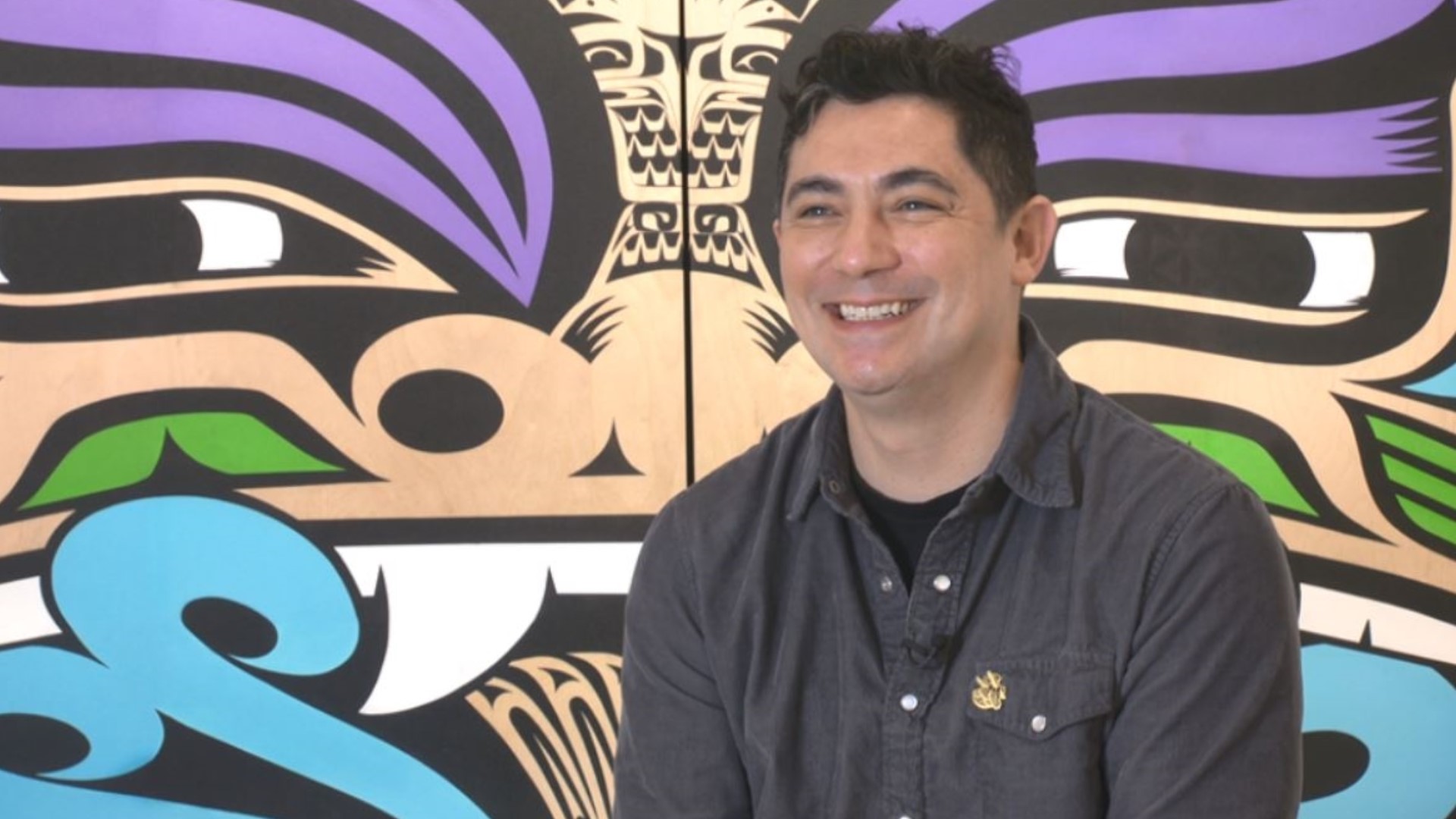SEATTLE — Seattleite Louie Gong is one of the most successful Native artists in history.
The founder of art and lifestyle brand Eighth Generation earned the designation when he sold his company to the Snoqualmie Tribe in 2019. He's now "retiring" by stepping down as CEO in January 2022.
"I always tell people it may look like fast success from a distance, but if you're close-up you'll know this success is made up of thousands and thousands of little failures,” Gong said.
It all began roughly 15 years ago when he started hand-drawing custom Vans on the floor of his living room.
But to understand his ambition and deeper mission, Gong harkens back even further to his childhood spent on a reservation in Ruskin, B.C., and in the Nooksack Tribal community near Bellingham.
"That house in Ruskin had an outhouse, and we didn't even have a regular stove so my grandpa, who was Chinese, would cook these really magnificent six-course meals on a Coleman camp stove,” he said.
Gong often questioned his sense of self because of his mixed heritage (Native, Chinese, French, and Scottish.) And while other kids at his middle school were wearing Vans and Swatch watches, he couldn’t afford them.
But as an adult, he embraced his heritage. He became an educator, public speaker, and president of national non-profit the MAVIN Foundation.
He also bought that pair of Vans he always wanted and decided to decorate them with a contemporary take on Coast Salish art.
"I wore them to work the next day, and my co-workers said, 'man, those are sick! Where did you get those and how can I get a pair?'" he said.
Demand grew, so he launched a small business he named "Eighth Generation."
"When I Iook back at the distance I've traveled, it feels unreal,” Gong said. "It feels like I've lived a dream. The Native American dream."
He eventually moved from his 200 square foot living room into a storefront in Pike Place Market, and more recently into 30,000 square foot warehouse and office building in Seattle's Georgetown neighborhood.
The company also expanded well beyond customized shoes and Gong’s own designs.
It sells everything from $10 pins to $300 luxury blankets, and a core value is showcasing and supporting designs created by other Native artists from around the country.
For Gong, it wasn't just about making sales. It was about making systemic change.
"You have to imagine how it feels trying to be an Indigenous artist making a go of it, and then you walk through the mall and almost every store has a product with Native art on it but there's no Native artist associated with that product, so none of that money is coming back to Native artists who are creating the stories and aesthetics that people want to align with,” he said. "That seemed totally unfair to me, and so I leaned in to the anger and frustration that I had and tried to create an ethical alternative to the fake Native products that saturate the market."
At Eighth Generation, 30 Indigenous artists create (and are directly compensated for) all of the designs. In addition to being Tribal-owned, 75% of the staff is also Native (from warehouse associates to the CEO and COO.)
It was the first Native-owned company to sell wool blankets, and all the wool textiles in their Gold Label line are now produced at headquarters. On the day we visited, a Navajo warehouse associate was operating state-of-the-art machines that weave the kind of quality blankets his ancestors have made for generations.
"It feels really special, it feels fair, and it feels like poetic justice,” Gong said. "Here, we've shown how to take control of your stories, how to take control of your art.”
The knowledge extends beyond the artists, too. Gong believes there’s lasting impact in training and teaching every employee of the company.
"If they stop working here at 8th Gen, that knowledge that they've acquired here on the job stays in the community,” he said. “That's super important because if someone's doing it for us, it can always be taken away. If we're getting that knowledge ourselves, it can never be taken away. This change we have made is permanent. It will never go back to the way it was before."
Angela Dee Rapada, who helps steam and finish blankets before shipping them out, agrees.
"Patterns and designs, it's not just lines. There are stories between every line,” she said. "Through our art, we've been able to keep tradition. This is an amazing company."
On Jan. 12, Colleen Echohawk was announced as the new CEO of Eighth Generation.
"I'm just a huge fan of Eighth Generation, I have all the products! And more importantly for me, this is the next step in ensuring that native people and prosperity are lifted up in our community,” she said. "This is a Native city. We're one of the only cities in the country that's named after a chief. And yet we don't see enough representation of Coast Salish art and other Native art in this city. We have desire in this country and this city to have racial justice, and art is a part of that."
In celebration of his retirement, Gong made a sizable donation to the Seattle Indian Health Board Elders Program. He said moving out of the CEO chair offers him a chance to return to his art and explore new forms of storytelling.
"I don't know what it's going to look like in the future yet, but I know there will be more of that kind of work,” he said. “I grew up in a house with no running water and now I'm in a position to help other people that are in positions like I was growing up."
KING 5's Evening celebrates the Northwest. Contact us: Facebook, Twitter, Instagram, Email.

